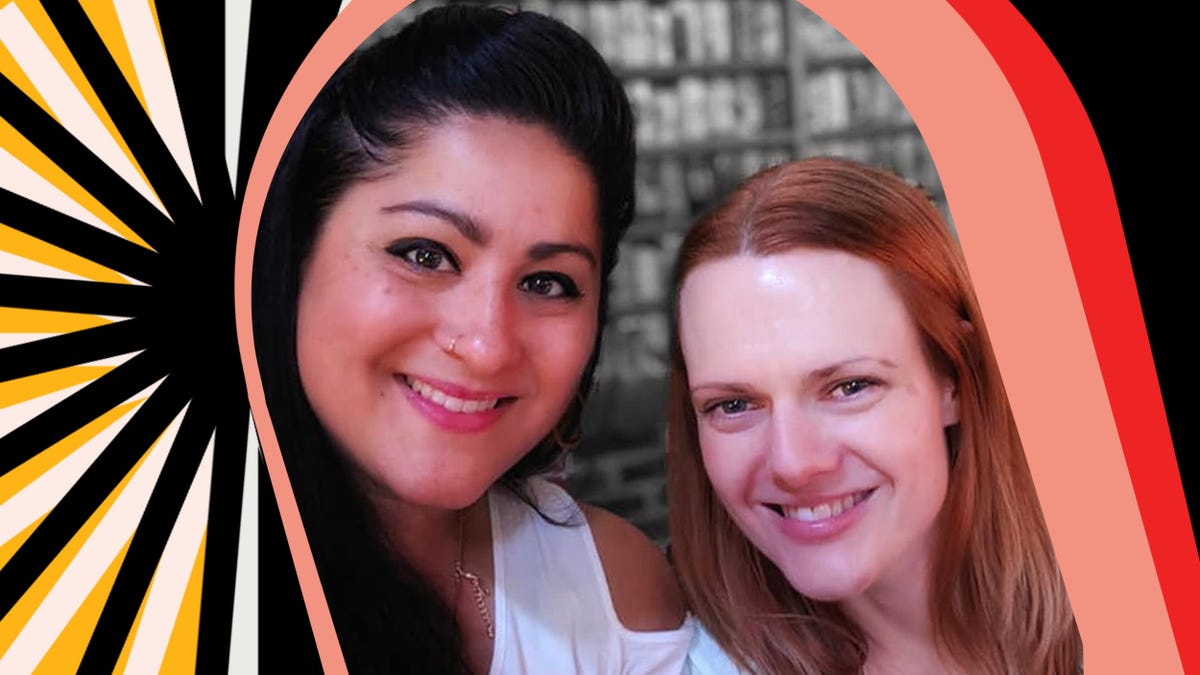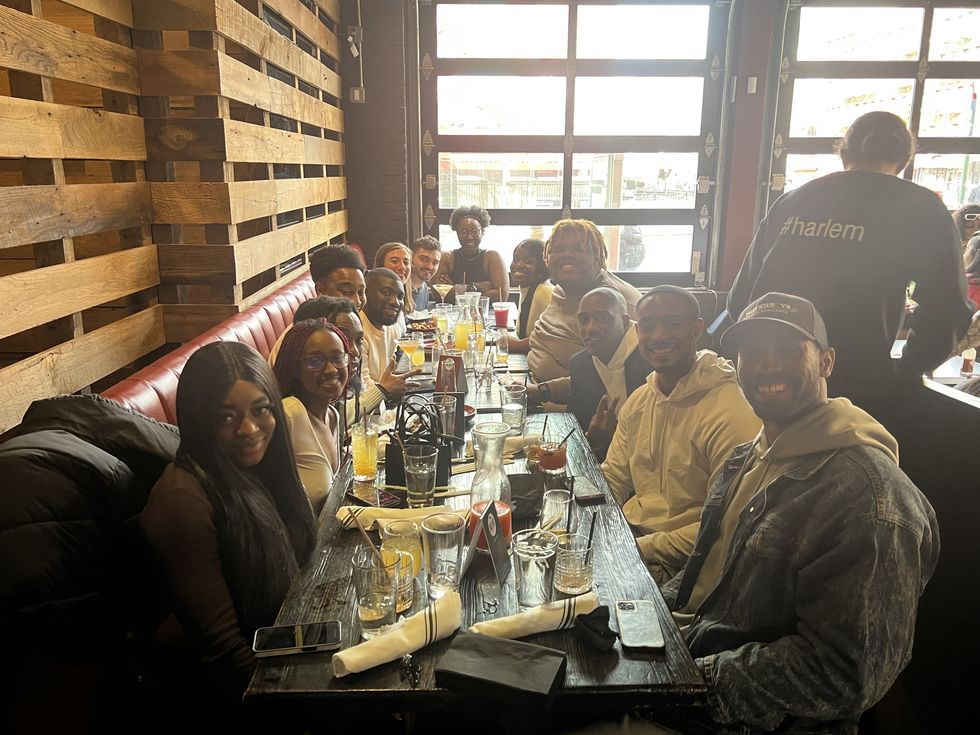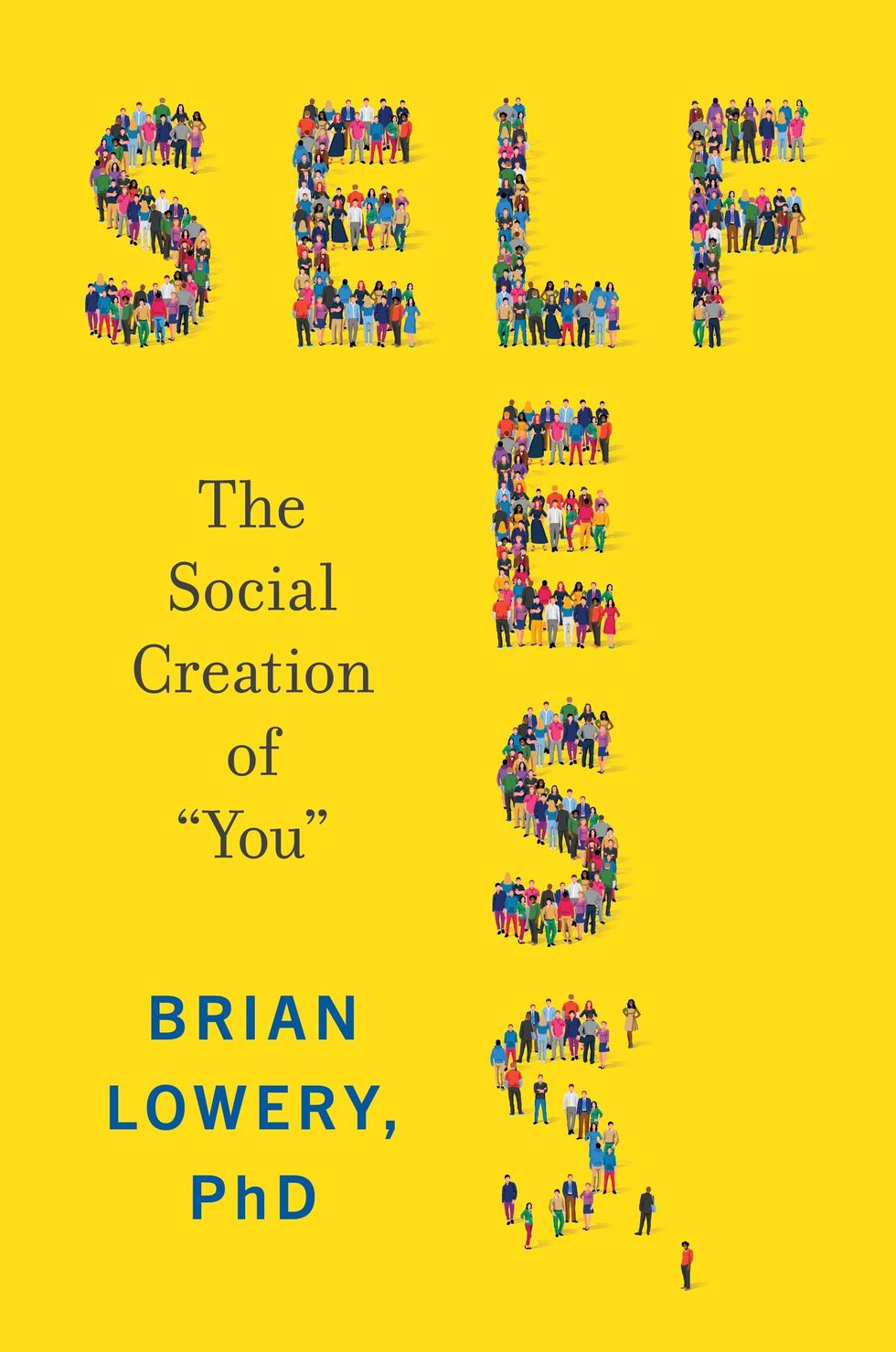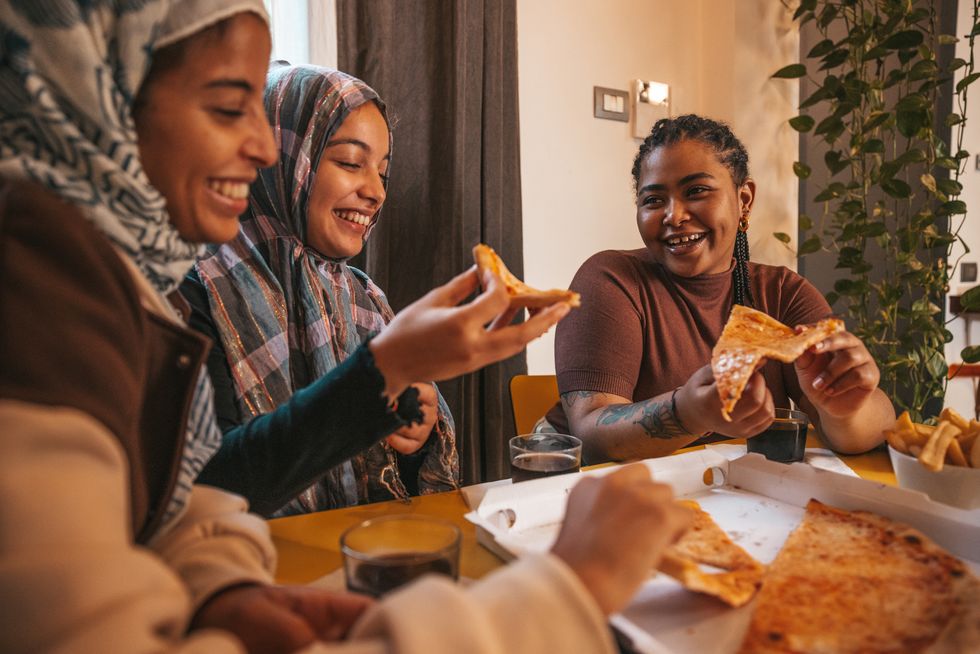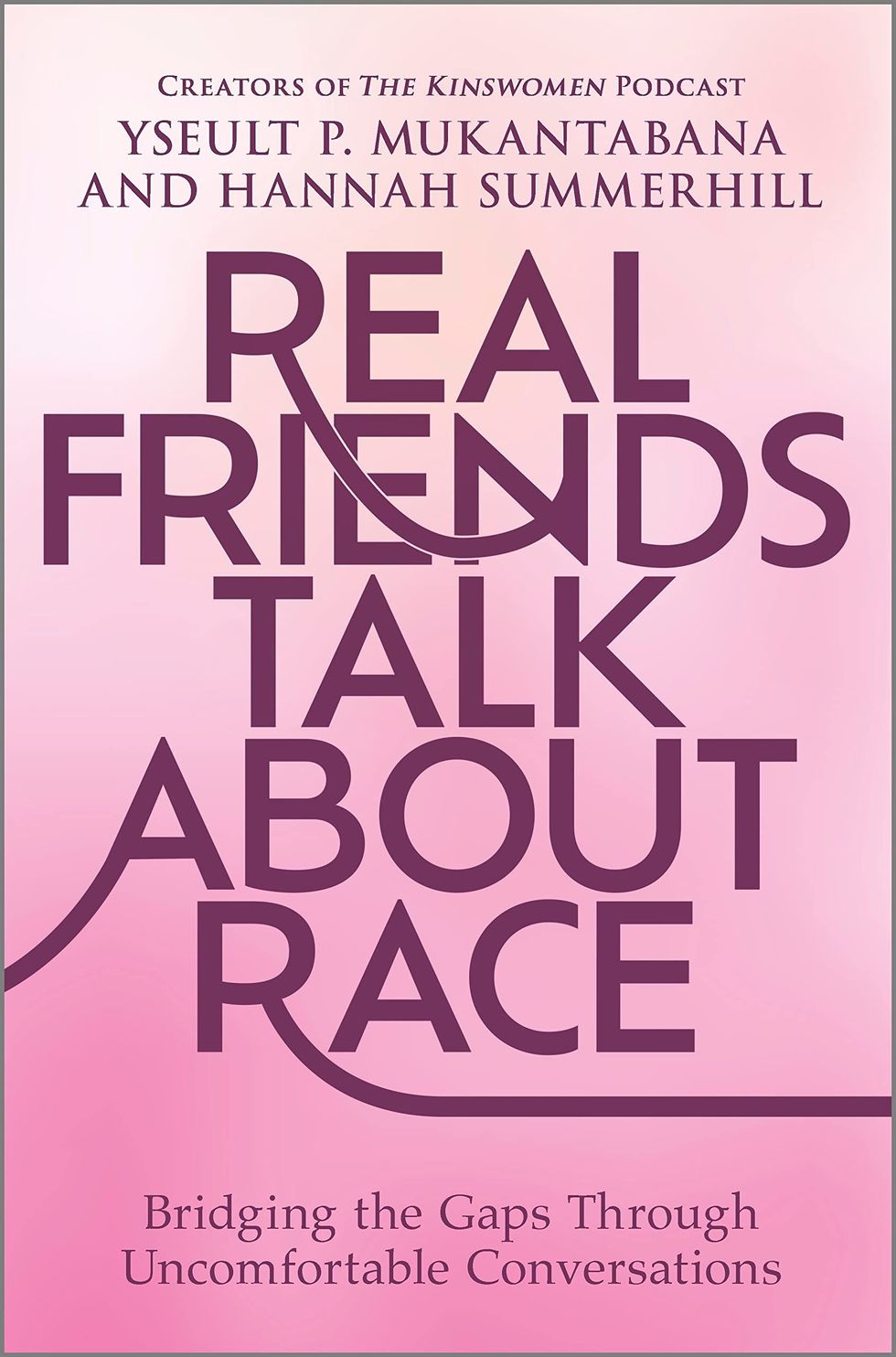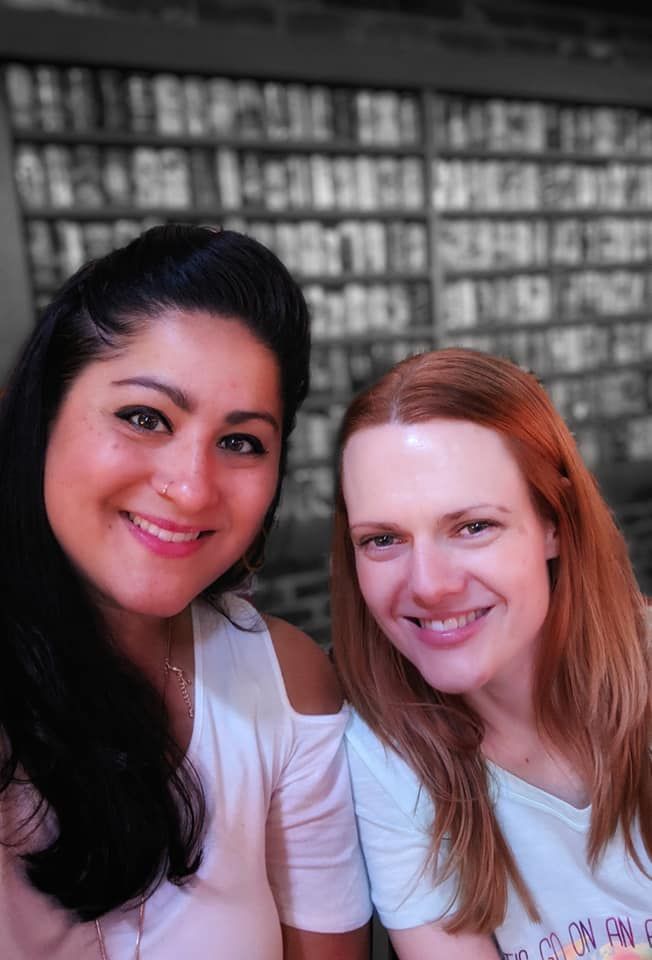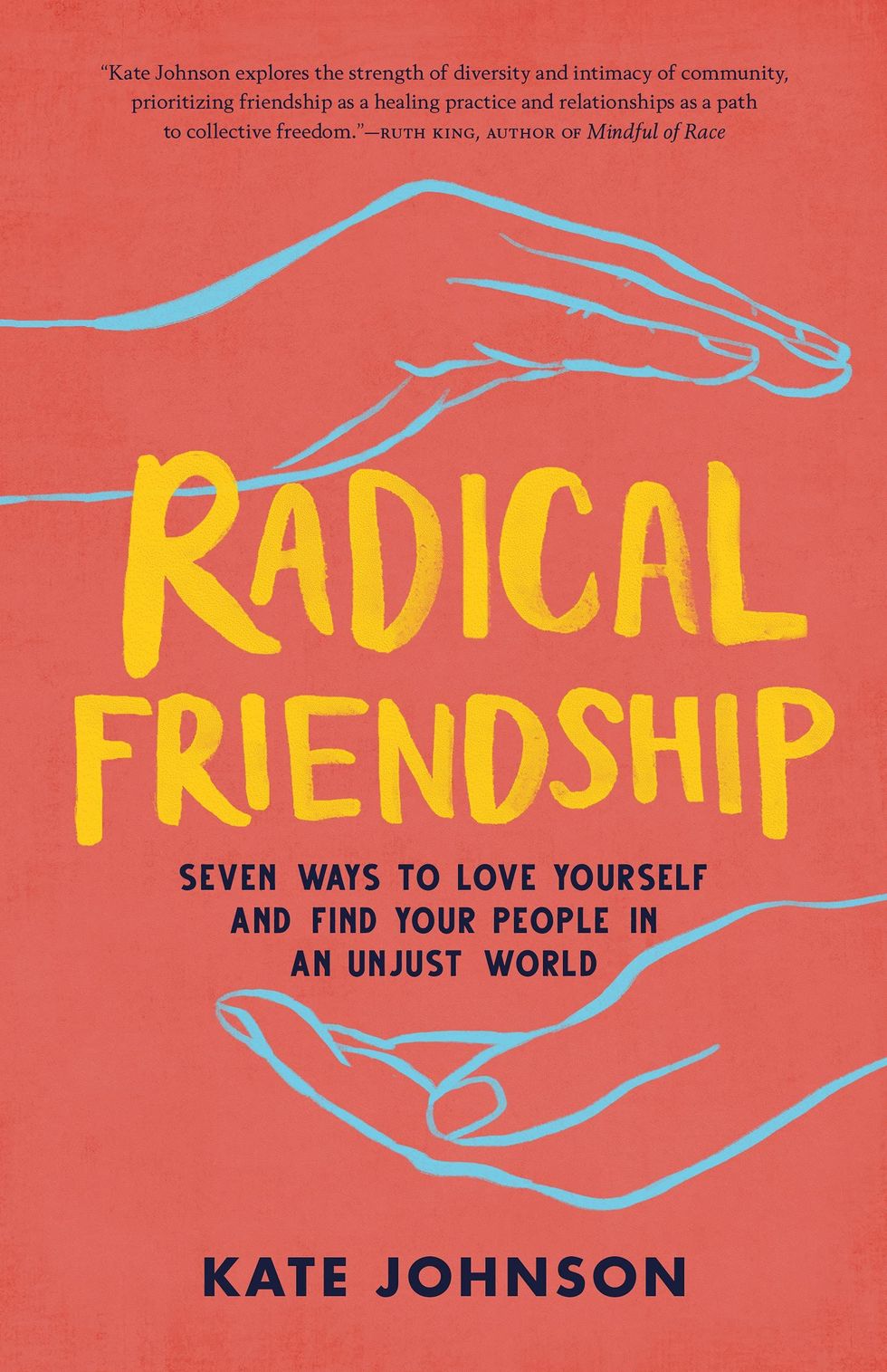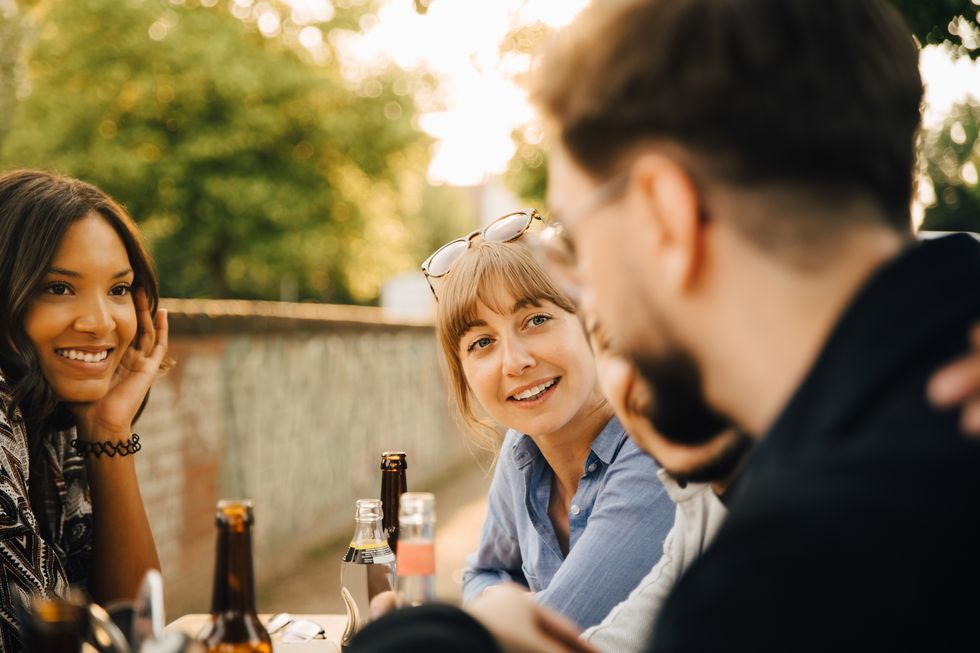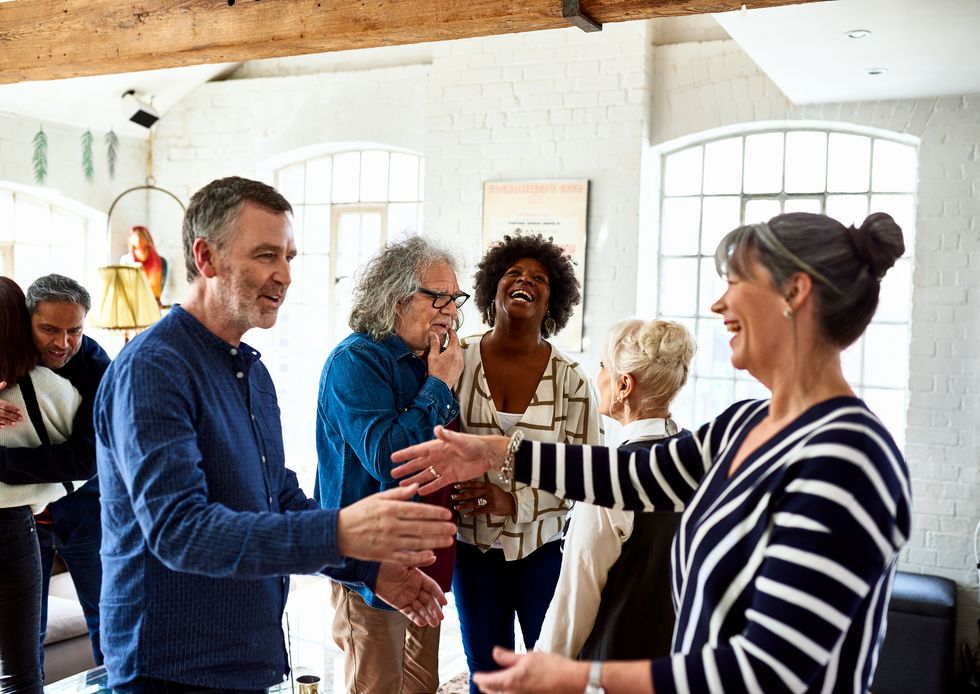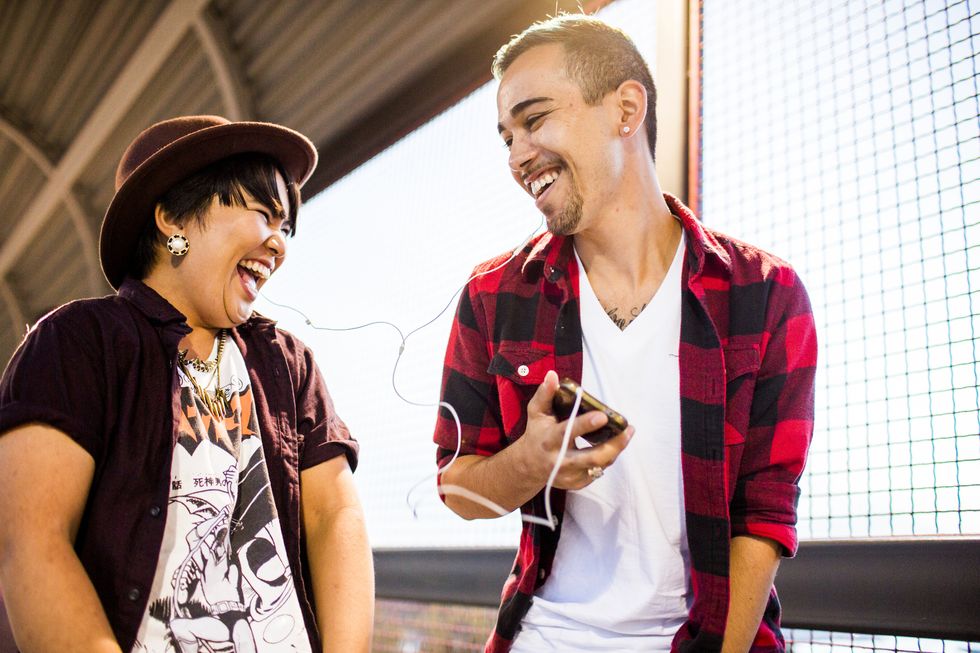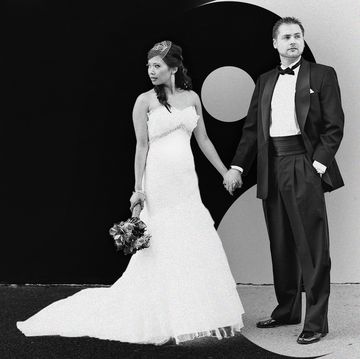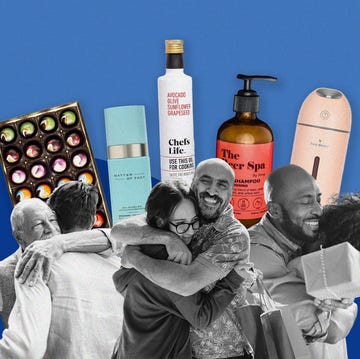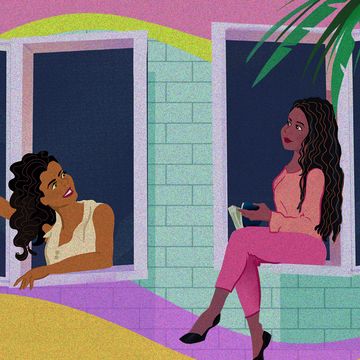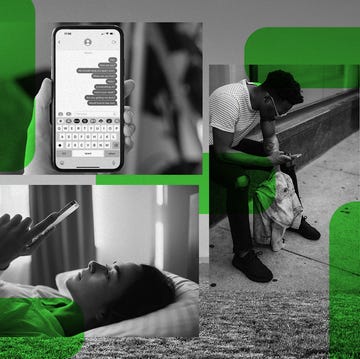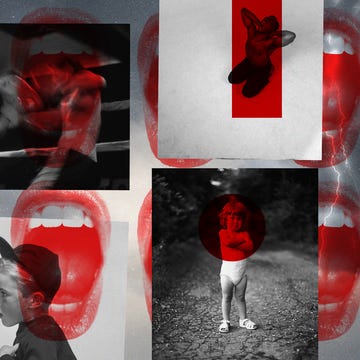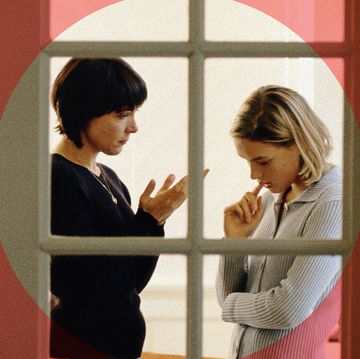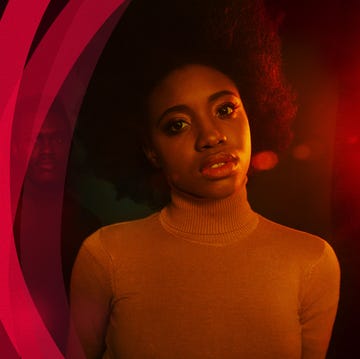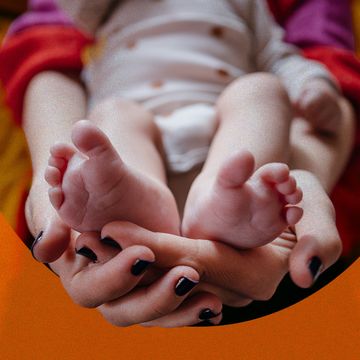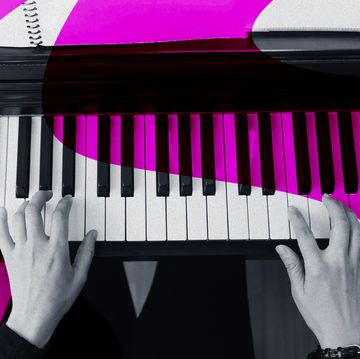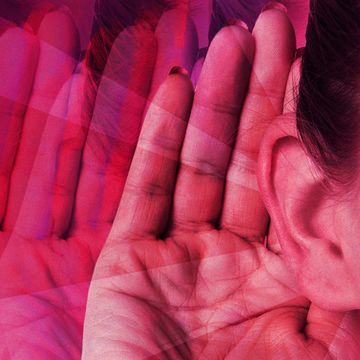Friendships are love stories too. In the Shondaland series The Art of Friendship, we explore and appreciate the beauty and complexities of friendship, as well as what makes it so powerful. From expert tips on how to navigate conflicts and deepen your friendships to uplifting stories of reconnections and advice on making new friends, these stories are reminders of the joy, value, and meaning that companionship brings to our lives.
Khaaliq Crowder grew up in what he considers the cookie-cutter suburbs of Long Island with an intersectional identity. “My mom was a correctional officer at Rikers,” he recalls. “My mom’s thing was ‘When I come home after a long-ass shift, I want peace and quiet, and you ain’t going to get that in New York City.’”
The 27-year-old New York native is Black, gay, plus-size, and neurodivergent. Coming of age around and coexisting with thin, straight, neurotypical, and mostly white people pushed him to expand whom he was surrounded by when he left home for the first time at 19. At college and beyond, he began growing friendships with more people who both looked and identified like him — and unlike him as well.
In the process, Crowder found that even the friends in the same communities as him are vastly different in ways he didn’t anticipate, from their religions and interests to how they were raised. Crowder met his friend Sabrya Said through the music industry organization Grammy U. After bonding over their shared love of music, they connected on social media and started hanging out in person.
During a conversation Crowder initiated about jumping the broom, a Black American wedding tradition that stems from a time when enslaved Americans physically jumped a broom to symbolize their union, which wasn’t legally allowed, he discovered that Said is Ethiopian and Muslim. Although they initially bonded because of their similar interests, their friendship led to a variety of conversations about customs and cultural differences. “The more I learn,” he says, “the better.”
Crowder credits being himself as the reason he’s been able to form bonds with a wide array of people. “My mom taught me when you put on that bright smile,” he says, “it lights up the room and attracts people.” He isn’t afraid of being curious and asking open-ended questions but also sharing about himself.
“It can be annoying, being the educator of things pertaining to the Black experience and culture,” Crowder says, “but sometimes you can’t be mad at people because a lot of times, I’ve been people’s first Black friend or first gay friend.” Sometimes, Crowder is the one who learns from his friends. “They can make you think about your identity in a different way,” he says, “in terms of how you see yourself and perception.”
Depending where and how you were raised, it can be challenging to have a diverse friend group with those from a different race, gender, sexual orientation, age, socioeconomic background, or other identity than your own. “The world organizes us in likes,” explains Brian Lowery, a Stanford University social psychologist and co-director of the school’s new Institute on Race. The author of Selfless: The Social Creation of “You” says people tend to be drawn to folks who are like them because they may more easily resonate with similar experiences. “It makes things more comfortable,” he says, “so it’s easier to get into the relationship. You probably feel safer. There’s more trust.”
Kate Johnson, a meditation teacher and author of Radical Friendship, notes that a growing number of people who have mainstream characteristics prioritized by societal systems — whether they are white, straight, cisgender, or able-bodied — are ready to break this pattern of homogeneity in their lives. “There’s a growing awareness on the part of those of us who have identities that are privileged by society,” she says, “that if we don’t actively seek to expand the type of people we’re in relationship with, we’re going to end up being with people who are like us most of the time by default. That’s how society is structured.”
From our schools and neighborhoods to highways and public transport routes, Johnson notes that cities are often built so certain people don’t have to connect up close with those who are on the margins of society, and vice versa. “We have to work to actually see and be around people who don’t share our experience,” she says. “There’s more to life than what we always grew up with and what we already know.”
This is the case for Aimée La Fountain, a 35-year-old journalist and communications strategist who grew up in New Jersey around people who were white and largely from generations who stayed within the same town as her. It’s one of the primary reasons she chose to go to school in New York.
“You can’t necessarily control the whole process of making friends because it’s a mutual thing,” La Fountain says, “but what I did and what I’m still trying to do is put myself in places where I’m more likely to meet a variety of people. If you appreciate those scenes and are open to that, that is how you diversify who’s around you.”
La Fountain started being introduced and introducing herself to the people she desired to be around, from different ages and professional fields to different races and sexual orientations. “You can’t shop for friends,” La Fountain says. “You never want it to seem you have a quota. It does have to happen organically.” Friendship, La Fountain says, takes intention. “I can definitely say that I’ve become a better person and my life is fuller the more diverse my friends group has become.”
Hannah Summerhill and Yseult P. Mukantabana, co-authors of the book Real Friends Talk About Race, are well-versed in the complexities of interracial friendships. “Unfortunately,” Summerhill points out, “our social circles tend to be segregated based on where we were born, went to school, and where we work." Diversity of thought, experience, outlook, and upbringing, Summerhill says, fosters much more depth, understanding, and empathy in a friend group. "Our friend groups can be microcosms for how we see and interact with the world," she adds, so it's ideal that our friend groups reflect the world.”
“Friendship,” P. Mukantabana notes, "has always been a portal to a community that’s a nook of peace ... I’d prefer to have a full and englobing perspective, something that feels closest to a 360-type view. Sticking to a mirroring environment doesn’t really provide that and thus I’d miss out on the vastness of our world.”
Connecting with people who are different from you can not only be fun and exciting, but it also exposes you to another perspective in the world. “In all relationships, people expand you,” Lowery says. “You are composed of the relationships you have. The broader and more diverse your relationships, in some way, the broader and more diverse you are.”
Johnson says more inclusive friend groups can lead to a healthy cross-pollination of ideas, skill sets, and more nuanced perspectives. “Another thing that’s really beneficial for folks is the sharing of resources.” Someone with privilege — whether financial, racial, or otherwise — who typically brings in people like them for jobs and housing, for example, may think to reach out instead to someone who doesn’t typically benefit. “It feels good to them to not just keep resources among the same hands, but to be able to put their resources towards things that they care about that are just slightly outside of what they would’ve known if they didn’t have that friend.”
Lowery believes that people have the ability to transform one another. “If you want to be bigger and live in a bigger world, you should be interested in having an interesting, diverse set of friends,” he says. Here are ways to widen your circle and welcome people from different backgrounds into your life.
Check yourself
Johnson first recommends that you evaluate your source of longing for different friendships. “It can be hard to attract friends if we’re only in it for the superficial appearance of having diversity in our lives and conceptually knowing that’s a good thing,” she says. “Folks can feel it if you’re just looking for someone who’s a particular skin color so you can check a box on your idea of what your friendship group should look like.”
Beware of befriending people for self-gain or out of guilt for whom you’ve buddied up with in the past. “If we’re going to make friends with people from a sense of lack or deficiency in some way,” Johnson says, “it creates an energetic neediness that makes us depleting to be around. If we’re comfortable in our own skin, and if we genuinely like who we are and we’re not ashamed of who we are, it makes space for other people to be all of who they are too.”
Try something new
Seek environments where there’s a possibility of several kinds of people. “Get out into the world,” Lowery advises. “It’s hard to make friends if you’re not interacting with people, so you have to find a place to engage with people.” Join a club, take classes, or engage in a hobby you’ve been wanting to pursue, like pottery or jewelry making, outside of your typical routine.
Whatever you choose to do, you’ll increase your chances of connecting with someone new by going solo. “If you’re signing up with a group of friends,” Johnson says, “you’re less likely to talk to other people in the class. Go by yourself, and you’re [more] available.”
Look at your existing network
The people in your immediate environments could be just as interesting as pals you may meet someplace new. “What’s interesting about those relationships is they tend to be, as a whole, more diverse than the strong friendships you have,” Lowery says.
When you drop your kids off at school or head into the office, who are the folks around whom you haven’t made an effort with but might want to get to know better? “You’re walking past whole worlds of people and don’t engage with them,” Lowery says. By default, you already have a common thread connecting you and a starting point for dialogue — whether it’s your child’s classes or a project you’re chipping away at in the office.
Be yourself
When meeting someone from another group, you may try to adjust your behavior, how you speak, or act in a way that you deem or guess is more acceptable to them. “Let yourself be seen and known for your idiosyncrasies, your quirkiness, and for the things that make you unique,” Johnson says. Don’t only showcase what you think will appeal to the other person.
“It’s a gift to other people when we can enter into friendship with them as our whole selves and with our whole heart, without leaving out any part of us,” Johnson notes. When we like ourselves and are comfortable with ourselves, it makes others feel more at ease around us. “If we’ve done the work to be at peace with all of who we are,” she adds, “then other people feel like they can be all of who they are around us.”
Talk about your interests
Sparking a conversation surrounding shared or differing authentic interests or passions — music, books, TV shows, or hobbies — is a great way to start any relationship. Dialogue around identity often comes down the line with more trust. “Really connect around genuine interests, and be curious to know who that person is and what they like, but also be willing to share who you are and what you like,” Johnson says.
You don’t have to be into the same activities or listen to the same artists, but the conversation is a great portal into knowing someone. “Friendship isn’t about only finding people who have shared interest,” Johnson says. “It’s having enough that’s overlapped, but also enough that it’s distinct.”
Open your mind
Sometimes, people may think they know someone — what they like or don’t like, or what they can or can’t do — based on how they appear. “We put people into groups,” Lowery says. “We have a sense of what that group is like, and then we assume people that are in that group are like other people in that group.”
Lowery continues, “Sometimes, we’re not sufficiently curious, and it sometimes prevents us from engaging with people in ways that allow us to get to know them and maybe become friends.” Be wary of seeking out someone because of an experience you assume they’ve had. He adds, “There is a difference between respecting identities and differences, and fetishizing those identities or differences.”
Embrace curiosity
People tend to overestimate how uncomfortable others will be if they ask them questions, Lowery suggests. “Trying to be polite or being worried about upsetting or making someone uncomfortable, people aren’t engaging with people as much as they could,” he says. This desire to understand a new vantage point can actually improve your friendship and increase trust, if done with compassion.
“When we have an inclusive friend group, we get to have a longer conversation about subtlety in view and in perspective,” Johnson says. “We’re already committed to one another, and we’re not going to abandon each other because of small differences like that.” Harm may happen when you try to exchange ideas across differences, and if it does, own your misstep. “If there’s a mutual commitment to a friendship,” she says, “then you can also find repair.”
Seek understanding
Someone who has been oppressed, marginalized, or othered might not necessarily automatically trust a person who, from a societal perspective, has power because of their identity. “It can be awkward to negotiate that,” Johnson says. She encourages engaging in anti-fragility, which means being able to endure hardship, have tough conversations, and withstand a certain amount of discomfort — and that’s not going to hurt you.
“Keep the faith, and keep the light in your eyes that says, ‘I’m curious about you. I want to have fun with you. I want to be a source of generosity and goodness in your life,’” Johnson advises. Letting your wish, openness, and availability for friendship shine on your face and in your body language can go a long way. “At the same time,” she adds, “listen to the other person’s energy, and give them space.”
Mia Brabham is a staff writer at Shondaland. Follow her on Twitter at @hotmessmia.
Get Shondaland directly in your inbox: SUBSCRIBE TODAY
